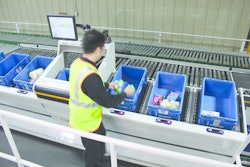Wider adoption of standards is key to both supply chain efficiency and meeting new consumer needs, according to a new report from Capgemini Consulting (of the Capgemini Group), GS1 and The Consumer Goods Forum.
Since the first barcode was scanned in 1974 standards have led to huge savings for the consumer goods industry allowing more efficient flows of goods and information. As consumers today become empowered through social and mobile technologies, they increasingly require real-time product updates and the ability to scan barcodes to obtain “beyond the label” data such as product origin, ingredients and manufacturing working conditions.
“The Future of Standards in the Consumer Goods & Retail Industry: Cut costs and meet new consumer needs,” report calls on the industry to introduce simplified programs to help users embrace and deploy standards while enabling provision of standardized product data to consumers.
“The Capgemini research sheds light on an important issue—as an industry we need to put more work into making sure standards are well-adopted throughout our business networks,” explained José Lopez, Executive Vice President, Operations & GLOBE, Nestlé. “We’re fortunate to have dynamic organizations like GS1 and The Consumer Goods Forum to help us with that.”
According to research by GS1 UK and Cranfield School of Management, barcode adoption saved the United Kingdom retail industry £10.5 billion in 2011 alone. Elsewhere, electronic standards allowed companies to move from manual paper-based processes, with benefits including shortening delivery times by 61 hours on average; cost savings of €12 to 18 per transaction; and five percent fewer out-of-stock situations. Nonetheless, with increasing industry challenges, more is needed to be done to ensure standards can be more widely adopted to help drive progress in the consumer goods and retail industry.
Based on in-depth interviews with leaders in supply chain and IT functions of 20 global consumer goods manufacturers and retailers worldwide, across Europe, Asia and North America, including Johnson & Johnson, Nestlé, Tesco, Unilever and Walmart, The results of the study showed that there are numerous challenges regarding standards faced by the industry:
- Underuse of standards – Compared to large companies, small and medium enterprises have significantly lower rates of standards use, with manual processing frequently the norm. Standards need to be extended to new channels such as e-commerce and affiliated transportation and logistics parties
- Data available through product barcodes is often missing or inaccurate and not provided in a standardized way across multiple channels
- Promotions are problematic as they are necessary for sales growth but difficult to forecast demand as retailers are often unwilling to share promotional strategies
- With the challenge of Big Data, retailers and manufacturers find it difficult to respect standards that require barcode numbers to change every time a product is slightly altered
- There is increasing scarcity of natural resources but also rising consumer interest in sustainable business - creating the demand for more accurate and consistent information on carbon footprint, water usage, recycling and energy consumption
“Standards have a fascinating past and an exciting future,” said Mike McNamara, Chief Information Officer, Tesco. “On the one hand, they are foundational to the way we do business, driving down the cost of our operations. On the other hand they are helping us to get closer to our consumers and meet their ever-changing needs, particularly in the digital world.”
To address the need for standards adoption, key findings from the report call for the need to:
- Develop marketing programs targeted toward companies not making full use of standards
- Introduce simplified standards programs for ease of adoption
- Use existing standards to communicate product information to consumers
- Collect sufficient information about product origin and route to market to minimize risk
- Develop solutions to ensure data quality
- Design new standards to facilitate the exchange of sustainability related data
- Expand GS1’s role from standards defining body to center of excellence in standards deployment
“Our report shows the urgent need for not only the greater adoption of standards and more consistency in standards implementation but also improved data, guidelines and governance across the consumer goods and retail sector,” said Susan Wood, Principal, Capgemini Consulting North America. “This is particularly important due to increasing consumer demands, which are driving the digital transformation needed to improve the shopper all-channel experience.”
To download the report, visit http://bit.ly/YNJVJm.







